______________________________________________________________________________________________________________________________________________________________
Best Of The Best - Josh Truan: "He was born for this"
By Pat Jones

Josh Truan arrived at Western Washington’s Gamble Sands just as the course was coming to life and has helped the facility become one of golf’s best destinations. His philosophy? “I’m only successful if my employees are successful.”
The superintendent who gave a then 16-year-old Josh Truan his first summer course job at Wing Point G&CC in Bainbridge, Washington, still remembers what made him special: “He was just like a hundred other kids I’ve had work for me at Wing Point over the years, but he clearly loved it and he could do about anything,” says Mike Goldsberry. “I remember him gravitating toward greenkeeping and thinking that he was just born for this. And he eventually landed in the perfect spot to do it.”
Truan’s successful path in the business began with a combined love for sports and the outdoors that lured him into the world of turf and brought him to Goldsberry. “I learned how to walk-mow greens and rake bunkers day one at Wing Point and I was hooked,” says Truan. “I liked being outside and didn’t mind getting up at 5 a.m. and it snowballed from there.”
We caught up with Truan this spring just as he was in the final stages of building the new Scarecrow course with designer David McClay Kidd and continuing to refine Gamble, which has become both highly ranked and highly desirable as a destination getaway.
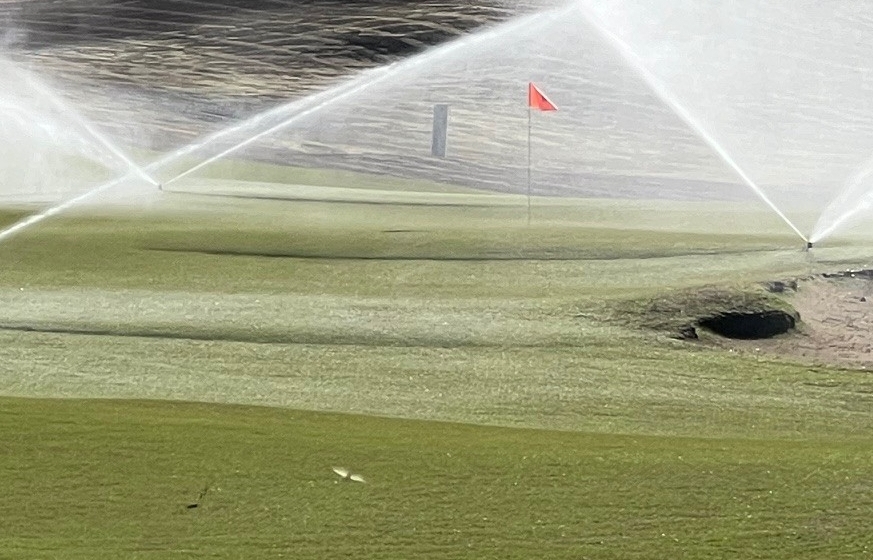
Courtesy of Gamble Sands.
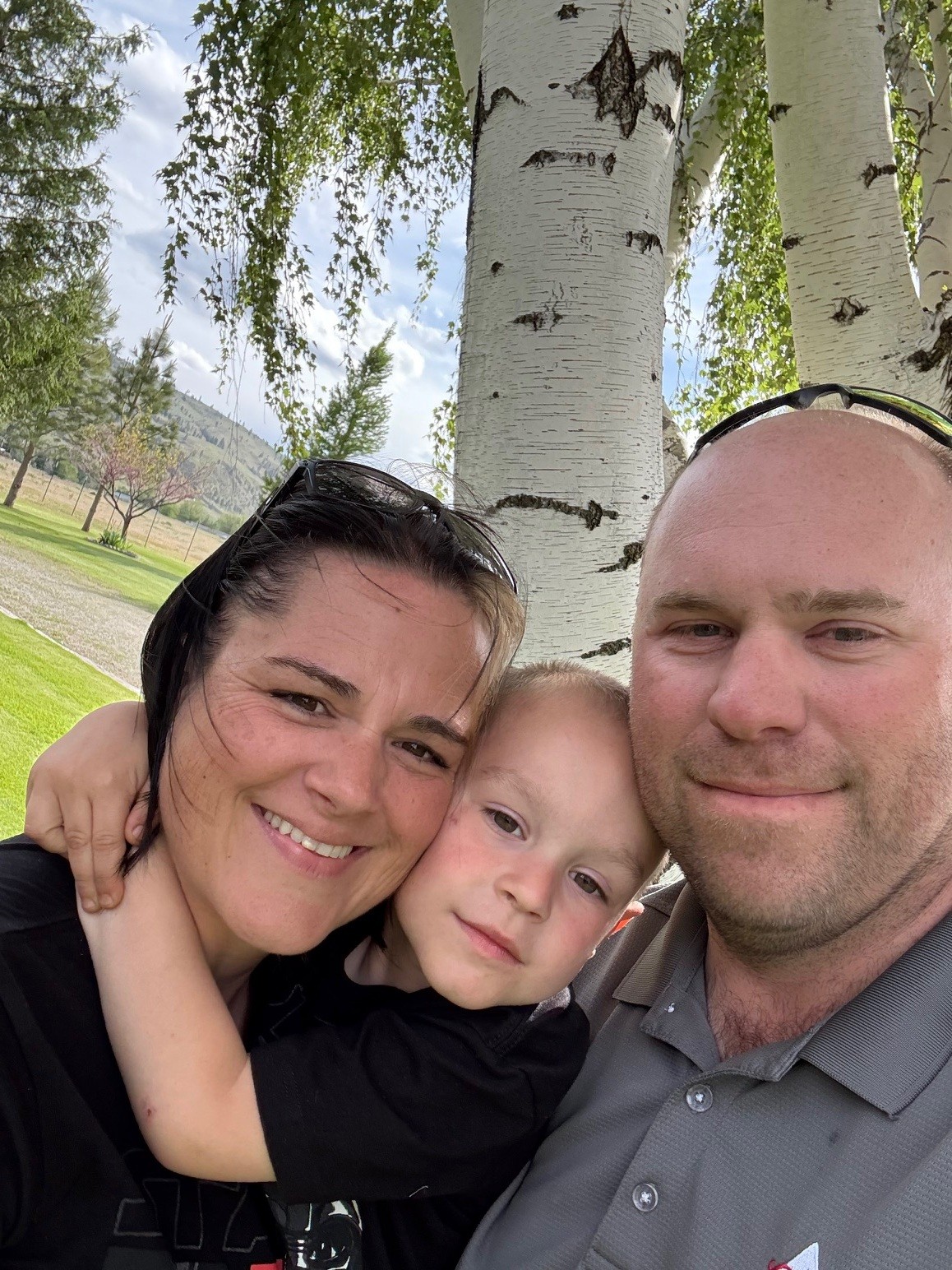
Josh with his wife Amber and son Jack
Courtesy of Gamble Sands.
What were some of the lessons you learned working for some great bosses?
Hard work is important. It’s very important. But if you can’t communicate with people and get your staff members to do the same, then it’s all kind of worthless. Jeff Steen (at Spanish Bay) also taught me that our job as managers is to get the most out of people. To make them successful. At age 22, that was a lesson no one had ever taught me.
I was trying to be the guy who’s going to get more done than anyone else. But at a Pebble Beach or Gamble Sands level, I’m only successful if my employees are successful. That was a big thing that I had to learn. I’m 36 now and still learning how to do that. You really learn it when you teach it to someone else. We all make mistakes. It’s okay to make mistakes. Just don’t make the same one twice.
So talk about how work-life balance fits in that equation?
For me, it’s been about getting my family involved in what I do. On my first date with Amber, I told her my summers are crazy…but she works in (Washington’s huge) cherry business so her world gets pretty crazy too.
Also, my rule is “Be here when you need to be here and don’t when you don’t.” It’s so simple and makes so much sense. When you can’t get anything more done, get out of there. There’s no point in just sitting around and being seen. The industry isn’t like that anymore and my ownership isn’t like that. The days of the super “needing to be seen” are over. Go home!
What were some lessons you learned about leadership?
It's hard, but when your team is busting their butts, take a step back and say thank you…you did a great job today. It’s a tough thing but it’s something you have to practice. Practice being a leader, being a mentor, and being the boss. It takes practice and work.
I’m trying to hire a couple of assistants right now. I used to look for the smartest guy or the best resume, but I’ve learned the personality side of it is as important if not more important. Now, I’m looking for someone who complements my personality. I also want someone who can be coached and who wants to be coached. Finally, I want someone who recognizes that we’re doing some cool stuff here and, if they really listen, they can be part of it.
How is Gamble Sands culture different from other facilities?
Gamble Sands agronomy department is an outlier when it comes to golf maintenance. We do a lot of weird things that most standard American golf courses aren’t doing. We’re essentially the general contractors for the property. We’re here for the operations and the company. We’re doing whatever we need to do to get the job done. We’re not worried about what the job description says. If we need to get something done, we’re going to get it done. It comes back to be here when you need to be here and go home when you don’t.
What’s different about your climate?
We have temps of 110 degrees in the summer and it’s down to - 5 in the winter. It’s windy spring and fall…we had 45 mph winds the other day. ET rates at .45 in the heat of the summer. It’s 90 degrees all day and the days are long. We’re high desert overlooking the Columbia River. We’re all sand, we’re super dry and the best thing we have going for is that we’re in control of the moisture.
Who had the biggest influence on you along the way?
Mike Goldsberry. He was the first superintendent I worked for and he kind of taught me how to work. The “get it done” mentality was a Mike thing. He also kicked me in the butt at the right time to get me out of there and move me on to the rest of my career.
Then Jeff Steen at Spanish Bay. He showed me the big picture and overall aspects of managing the property and he educated me about working for a big company.
He also taught me how to manage people with different needs and motivations. An Army recruiter told me once you have to find the “need behind the need.” What makes them want this job? He helped me understand that my job is to get the best out of my employees. I feel like if I do that then the golf course will take care of itself.
Finally, Chip Caswell, who was the super at Gamble when I got here as an assistant. He was a big mentor of mine. He taught me to grow in a golf course. He also told me how to deal with the crazy. He told me, “I’m going to throw a bunch of stuff at you and you’ve got to figure out how to do it and then an hour later I’m going to throw more stuff at you.” You have to learn to prioritize and get it all done, so I learned multitasking, building a system and how to build a maintenance program from scratch. There was a lot of time in the office talking about all those detail things. He was instrumental for me and he’s still a good friend. Now he just tells me to trust me gut.
What differentiates great from good in this business?
It starts with expectations. We have written expectations on the whiteboard in my office. It’s called “The Gamble Way.” For example, what does it mean to us to be firm? For us, we’re judging that based on how the ball reacts around the green. We want the course to play like it’s the British Open. We want balls rolling off slopes and feeding away from hole and we want people to be putting from 40 feet away, freaking out because the greens are rolling about 11.
Also, part of being great is meeting the neat, clean, tidy American golf standard. The details are huge but it’s also about mowing heights, edges, no scalps, no trash, etc. We talk almost daily about details like picking up trash. All of our guys carry a little can of weed spray. It’s a constant reminder of the details and our expectations. And Gamble’s rankings are also up on the board along with who’s in front of us and who’s behind us.
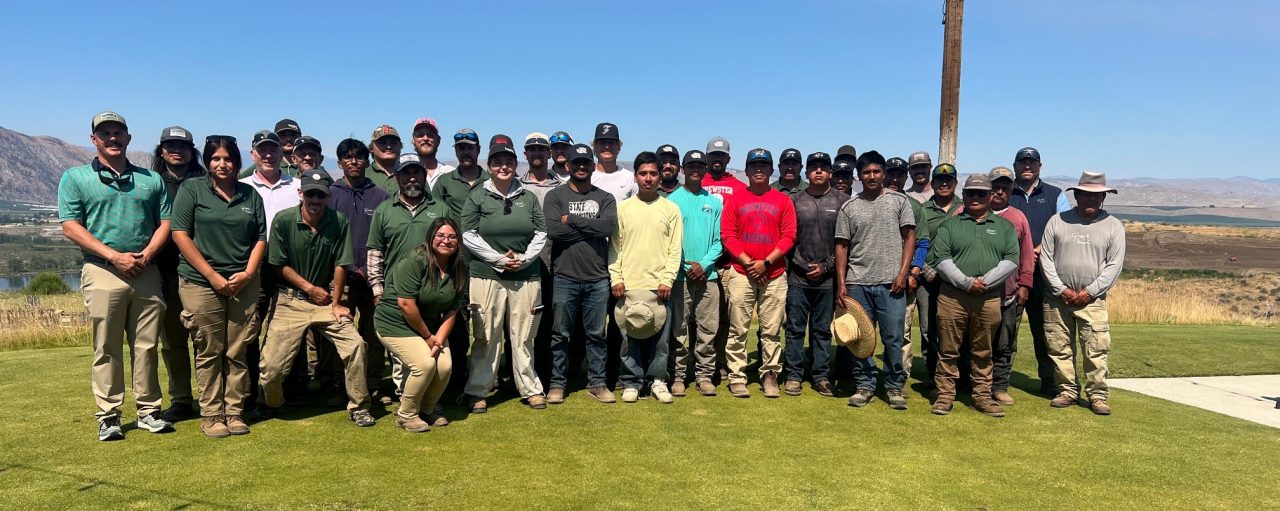
Gamble Sands Agronomy team
Courtesy of Gamble Sands.
How else do you build the team?
We do BBQ once a month for the team and do food themed to the whatever TV tournament is on. We’ll have the Masters on TV during the BBQ and show them what Augusta looks like and how they focus on quality and details. There’s a sense of pride with the crew when it comes to detailed stuff.
Why don’t other folks do that?
It creates vulnerability as a manager – admitting you don’t have all the answers because you don’t. Once you make peace with that, you’ll feel a lot better. The smartest thing you can do is say “I don’t know…what do you think?”
We have weekly leadership meetings, and we’ve found people will engage more if they’re involved in making the decision. If my leadership team and my foreman and senior leaders are on board, they can sell it to the crew better.
Why is Gamble Sands such a special place 12 years after it opened?
I mowed the first hole for the very first time. I’ve been very fortunate to be here since the beginning and to have our ownership empower us to do what we needed to do. The only directive I’ve ever had is to make Gamble world class, so I got to define what world class means. It’s been amazing.
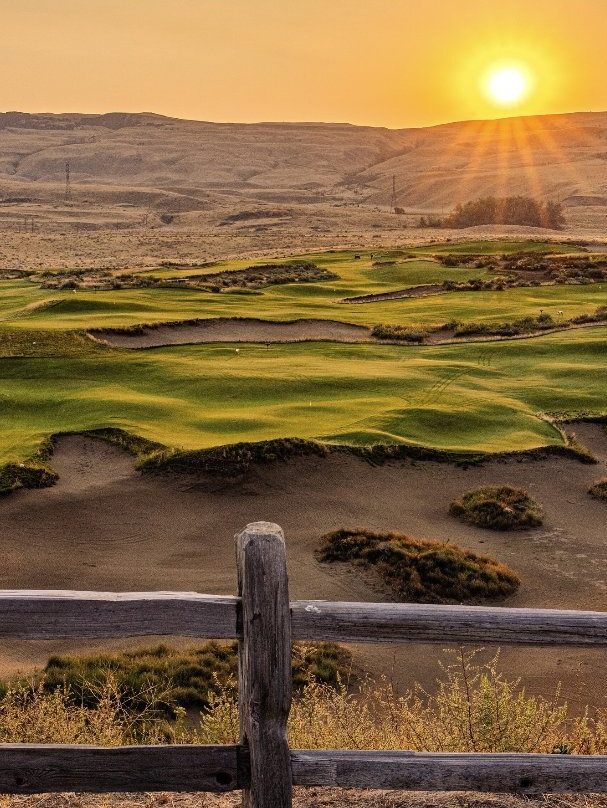
Courtesy of Gamble Sands.
How does that evidence itself?
One example: You’ll never see a maintenance worker mowing during play. We stay ahead of them. Also, the weather is always nice here. We’re a links course where you can ride a cart and that’s different than other destinations. The vibe is very authentic and welcoming. You feel like you’re at home.
The first couple of years were tough and we weren’t making a whole lot of money. So, we made it desirable to come. For example, if they were punching greens in Seattle, we weren’t punching greens here. We were able to make good decisions to help the bottom line. Being here from day one gave me that opportunity and taught me to think that way. More supers should be involved in the business side of things because we sometimes get tunnel vision about turf. You need to be involved in those conversations.
How will the new course be different?
Scarecrow is our fourth project here. David McLay Kid calls it a different side of the album. Gamble is side A and Scarecrow is side B. He’s at a different place in his career in terms of architecture. He’s developed his style to a point where it’s friendly for high-handicappers and also challenging for the better players.
Visually, you can see a lot more of the property on Scarecrow. There’s a 350-foot elevation change and it’s up and down, all around, all over! On Scarecrow you can see 14 or 15 holes across the course. The vistas on Scarecrow are even better. We’re opening August 1 for public play.
What’s been the most fun?
Being able to get better every day. We’re always doing new things so you’re not stuck in the maintenance grind. And being able to be at home, have a family, and be involved in the community. Last but not least we get to build and do cool stuff – and we have an owner that trusts us to do it. That’s what makes it fun. We love it here.
What are the agronomic issues you deal with?
We’re a four-season environment and our number-one issue is thatch. Fescue loves to build thatch. To get through the summer we’ve got to keep feeding the fescue through the year. We can’t try to starve it out and let it go dormant in the summer. If it does, it won’t be a good playing surface.
Culturally, we’re going to do 33,000 rounds or so a year – nearly all with carts – so my top three issues are traffic, traffic and more traffic.
Being fescue, we’re always going to fight with Poa. It’s never going to go away. So we focus on keeping the greens clean. And our whole goal is to wait until it’s 105 in the summer and kill it. Also, we stay dry. We normally only water .6” every three days.
I still pull cores in the fall and solid-tine in spring. You can’t relieve compaction with solid tines. You have to take cores to relieve compaction. Then we use vent tines every 60 days or so. It’s all about sand, sand and more sand. We’re not really trying to remove thatch any more, just diluting it.
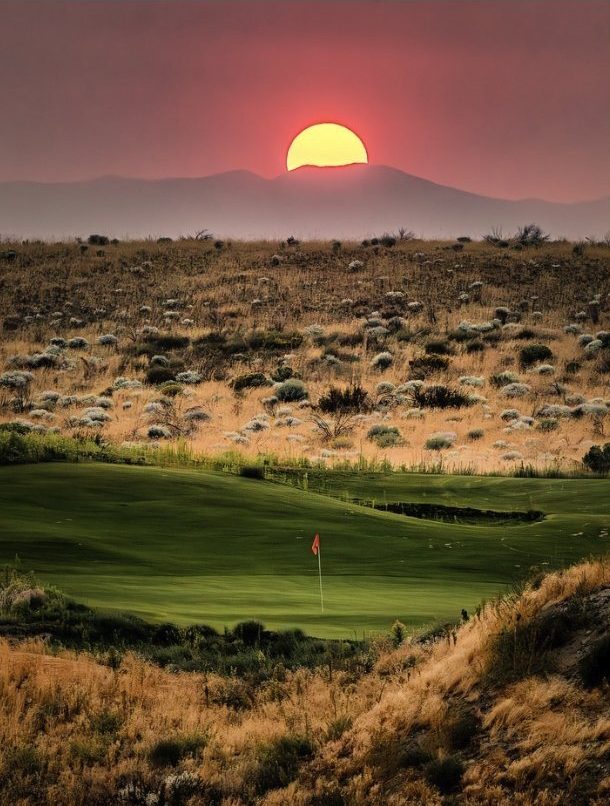
Courtesy of Gamble Sands.
How important is it for you to have industry support from companies like BASF?
That’s one of the most underrated things in our industry. The relationship between you and these great companies and their technical people is one of the keys to success. You have relationships with the right folks because they can and will help you immediately. That’s one thing we need to teach assistants better.
How does that support happen?
Jen Browning from BASF is a great example. As a director of agronomy, it’s just as important for me to cultivate our relationship with her as it is for her to cultivate one with us. It’s a mutual support system. Too often I hear from others in the industry that they only talk to their technical rep when something’s broken. That’s a shame.
I do an assistant superintendent conference called “Wing Man” every year that Jen helped us establish. We have a roundtable discussion with some key industry folks about the importance of relationships between suppliers and supers at every level. I think it’s extremely important because not enough assistants get that kind of information.
Which BASF products are mainstays for you?
We’re spraying 165 acres of Maxtima right now as we speak. It’s going out on all of our short grass. We also rely on Insignia, Xzemplar and my personal favorite, Pendulum AquaCap.
We had some pretty bad fairy ring issues about four years ago and Jen was very engaged in helping and visited multiple times. She’s always here to support us. The Insignia now helps a lot with that fairy ring thanks to Jen and the people from BASF.
What’s your philosophy about your plant protection program?
Keep it simple, stupid. The KISS method. I want to be able to pick and choose options and, if I can’t see or measure the results of something I spray, why am I spraying it? It has to be effective and cost-effective. Otherwise, why do it? There has to be a measurable result. That’s one reason I rely on BASF.
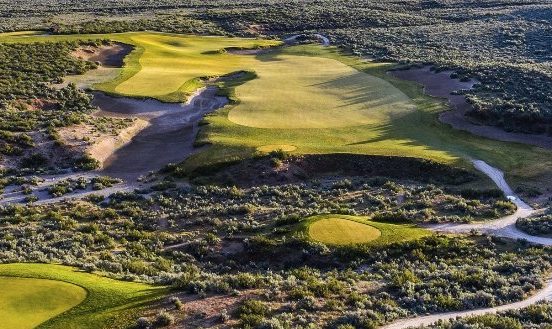
Courtesy of Gamble Sands.
Final thought about GOAT-ness:
When I think of GOATs, I think of the overall impact they’ve had. You don’t judge Tom Brady – the GOAT of pro football – on just one aspect of his career. But in our world, you have to consider everything. It’s which course they’re at, turf conditions, relationships, being financially responsible and other basic stuff. I actually believe more guys lose jobs because they are financially irresponsible than because of poor conditions.
So, a GOAT can mean lots of things in our world, but for me? Who’s my GOAT? Well, I never worked for him, but he’s always been amazing to me. My GOAT is Jeff Markow from Cyprus Point. I’ve only met him a handful of times and he always remembered me. That was so cool. And I’ve never heard anyone say a bad thing about him. So, even though I didn’t work for him or spend years with him, those are the things that make Jeff Markow my GOAT.
Oh, I also have one more GOAT in my life. That’s Amber. She’s been an absolute rock and she’s embraced the world of turf and Gamble Sands. It doesn’t get any greater than that.
Always read and follow label directions.
Maxima, Insignia, Xzemplar, and Pendulum AquaCap are registered trademarks of BASF.
All products may not be registered for sale or use in all states. Check with your state or local extension service. ©2025 BASF Corporation. All rights reserved

